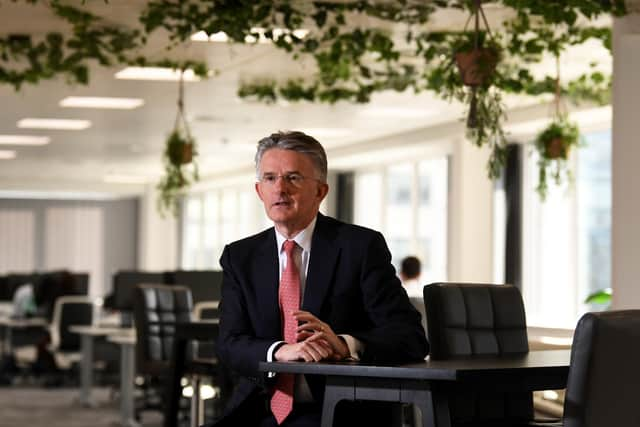Infrastructure Bank CEO John Flint claims the cost-of-living crisis will affect how UK companies are able to fund green projects
John Flint told The Yorkshire Post that he believes long-term projects which benefit from price stability will suffer from what he referred to as a “tough environment” for UK businesses.
Asked if he believed cost-of-living issues would affect how companies can deliver schemes to mitigate climate change, Mr Flint said: “Yes. It would be great to say no, it's a non-issue, but I think that would be a complacent answer.
Advertisement
Hide AdAdvertisement
Hide Ad“I think that as the energy crisis and the result of inflation problems ripple through, it is not just a consumer problem but a business problem, and it will become a project problem as well, and an infrastructure problem.”


Mr Flint, who took charge of the newly-formed UK Infrastructure Bank in Leeds last year after previously being HSBC chief executive, noted his belief that cost-of-living issues would also lead to the UKIB being required more than it has been previously.
“I think from our perspective it probably means we’re going to be needed more than we would have been before this crisis,” he said.
“We have a role to play in plugging gaps, solving problems, and at times giving the market confidence.
Advertisement
Hide AdAdvertisement
Hide Ad“But I think it's inevitable, the energy price shock and the inflation shock is something that is going to impact all aspects of the environment.”
Mr Flint added, however, that he believes such issues will not hinder the UK’s ability to reach net zero by 2050.
“I'm not sure it’s pushed us back,” he said. “It might have accelerated us.
“Economic dislocation is a real problem for the broader economy - but I wouldn't necessarily conclude that it's setting the net zero agenda back.
Advertisement
Hide AdAdvertisement
Hide Ad“We might be sitting here ten years from now looking back and figure out that actually this was an accelerant and helped in that transition.
“In a terribly ironic way, the current energy prices are creating incentives for people to get off hydrocarbons and on to something else.”
He added, however, that rising energy costs will still lead to issues when looking for investors in green projects.
“It's still a complex challenge, because if you want to build the infrastructure to get people off hydrocarbons, you still have to find people who want to invest in it and an investor will want to know what a projects going to cost.
Advertisement
Hide AdAdvertisement
Hide Ad“And that's hard now when energy is an input into everything, into the price of steel, into the price of concrete, and so on.”
Mr Flint said that he did not believe the cost-of-living crisis would hinder the UKIB’s ability to fund projects linked with levelling up.
He said: “We have our financial capacity established, we’ve got our budgets with HMT, so I don’t think there's any risk that our mandate or our activity is going to be affected.
“Our mission is to finance the infrastructure in service of levelling up, we need to continue building the organisation and get on and deliver against that mandate.”Mr Flint’s comments come shortly after former levelling up minister Neil O’Brien warned that the government’s levelling up policies may be threatened by rising costs and inflation prices.
Advertisement
Hide AdAdvertisement
Hide AdSpeaking to The Times, Mr O'Brien said: “Inflation will make a lot of projects less viable, because construction-cost inflation is even higher than general price inflation.”
Mr O’Brien added that it was time for the government to “face up to reality” over the effects of inflation on their levelling up policies.